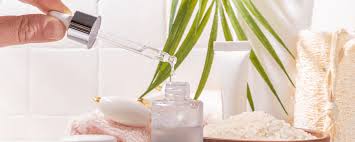
.webp)
.webp)
.webp)
Ferments and Fermentation in Skincare: The Science Behind the Trend
.webp)
.webp)
Fermented ingredients have become one of the hottest trends in modern skincare. You’ve likely seen them in serums, essences, and moisturizers from brands like SkinMedica or SK-II. But what do they actually do?
.webp)
.webp)
.webp)
Despite their popularity, there’s still limited scientific research supporting many of the bold claims made about ferments.
.webp)
.webp)
Still, interest continues to grow because early findings—and centuries of tradition—hint at promising benefits.
.webp)
.webp)
This article dives deep into what fermented skincare ingredients are, how they work, the types most commonly used, their potential benefits, and the risks to be aware of.
.webp)
.webp)
What Are Ferments?
.webp)
.webp)
.webp)
Fermentation is a natural process that uses microorganisms—like bacteria, yeast, or fungi—to break down substances. In skincare, it makes active ingredients smaller and more absorbable.
.webp)
.webp)
During fermentation, complex molecules like sugars or proteins are converted into simpler forms. These can include lactic acid, peptides, amino acids, and enzymes.
.webp)
.webp)
.webp)
The result is an ingredient that may be more bioavailable—meaning your skin can absorb it better and faster. This can lead to increased potency and deeper skin penetration.
.webp)
.webp)
Why Is Fermentation Trending in Skincare?
.webp)
.webp)
.webp)
Fermentation isn’t new. It has been used for centuries in foods like kimchi, yogurt, and kombucha. In skincare, Korean beauty brands helped popularize ferments.
.webp)
.webp)
Now, Western brands have followed suit. Ferments are being touted for their brightening, anti-aging, and hydrating effects.
.webp)
.webp)
.webp)
However, it’s important to note that scientific evidence is still emerging. Many claims are based on lab results or ingredient potential, not human clinical studies.
.webp)
.webp)
Benefits of Fermented Ingredients in Skincare
.webp)
.webp)
.webp)
Although research is still limited, here are some of the most widely reported benefits of using ferments on the skin:
.webp)
.webp)
1. Enhanced Absorption
.webp)
.webp)
.webp)
Fermentation breaks down large molecules into smaller components. These tiny particles are easier for your skin to absorb, making the product more effective.
.webp)
.webp)
2. Increased Efficacy
.webp)
.webp)
.webp)
Fermentation may increase the concentration of beneficial compounds like peptides, antioxidants, and vitamins, making products more potent.
.webp)
.webp)
3. Skin Barrier Support
.webp)
.webp)
.webp)
Some fermented ingredients help strengthen the skin’s protective barrier. This can help defend against pollution, irritants, and moisture loss.
.webp)
.webp)
4. Microbiome Balance
.webp)
.webp)
.webp)
Ferments that include probiotics may help support a healthy skin microbiome by boosting good bacteria and reducing harmful strains.
.webp)
.webp)
5. Anti-Inflammatory and Calming Effects
.webp)
.webp)
.webp)
Certain fermented extracts contain soothing agents that can reduce redness, inflammation, and sensitivity.
.webp)
.webp)
Potential Side Effects of Ferments
.webp)
.webp)
.webp)
As promising as ferments are, they may not be for everyone.
.webp)
.webp)
People with sensitive or reactive skin might experience irritation, especially if the product has a high acid content due to fermentation.
.webp)
.webp)
.webp)
Some fermented ingredients can alter the skin’s pH balance. This may lead to dryness, breakouts, or increased sensitivity in some individuals.
.webp)
.webp)
There’s also the issue of long-term safety. Most skincare studies involving ferments are short-term or done on isolated skin cells—not on real people over time.
.webp)
.webp)
.webp)
Popular Fermented Ingredients in Skincare
Let’s look at the most commonly used ferments and what each one brings to your skincare routine.
1. Alteromonas Ferment Extract
This marine-derived ferment contains polysaccharides that protect the skin from pollution. It chelates heavy metals and boosts collagen production by up to 67% in lab studies.
It also supports hydration by increasing hyaluronic acid levels and improving skin elasticity.
2. Bacillus Lysate
Made from Bacillus bacteria, often from hot springs. This ferment reduces wrinkles and enhances skin repair by stimulating collagen and reducing inflammation.
Studies show it improves antioxidant capacity and cellular health.
3. Bifida Ferment Lysate
Extracted from probiotic Bifida bacteria, this ferment helps strengthen the skin barrier and reduce inflammation. It’s often recommended for sensitive or aging skin.
You can find it in popular products like Lancôme’s Advanced Génifique.
4. Chlorella Vulgaris / Lupinus Albus Protein Ferment
This ferment delivers antioxidants like chlorophyll and lutein. It protects against oxidative stress, boosts hydration, and helps the skin stay supple.
Lupin peptides also support collagen synthesis, improving firmness and elasticity.
5. Galactomyces Ferment Filtrate
Derived from yeast, this is the star ingredient in SK-II’s Facial Treatment Essence. It helps brighten skin, improve texture, and hydrate deeply.
It also provides amino acids and vitamins that support youthful skin.
6. Kombucha Ferment
Made by fermenting tea with bacteria and yeast. Kombucha is packed with probiotics and antioxidants that boost hydration, even tone, and defend against pollution.
The polyphenols become more bioavailable, giving stronger antioxidant effects.
7. Leuconostoc / Radish Root Ferment Filtrate
This is created using radish root and lactic acid bacteria. It has antimicrobial properties and is often used as a natural preservative.
It’s gentle, hydrating, and helps balance the skin’s microbiome—ideal for acne-prone skin.
8. Pseudoalteromonas Ferment Extract
This deep-sea marine ferment contains proteins and sugars that boost hydration, soothe inflammation, and repair skin damage.
It supports collagen production and protects from environmental stressors like UV rays.
9. Saccharide Isomerate
Produced by fermenting glucose using bacteria. This ingredient binds moisture to the skin, acting like a powerful humectant.
It also helps soothe irritation and enhance elasticity, giving the skin a plump and smooth look.
10. Thermus Thermophillus Ferment
Another marine-derived ferment, this one reduces inflammation by suppressing pro-inflammatory signals in the skin. It also hydrates and protects from oxidative stress.
It’s a great anti-aging and calming ingredient used in luxury skincare products.
11. Vibrio Alginolyticus Ferment Filtrate
This rare ferment comes from deep-sea bacteria and hydrates the skin quickly. Clinical data suggests it firms skin, reduces wrinkles, and boosts energy production at the cellular level.
It activates a protein called sirtuin-3, which supports long-term skin vitality.
Where Do Ferments Come From?
Ferments come from a range of sources, including bacteria, fungi, algae, and yeast. Many are derived from marine environments.
In fact, a major research project called the Malaspina Expedition collected marine microbes from around the world. Scientists discovered over 120 new bacterial strains.
Some of these have been developed into skincare ingredients. One strain from waters near Madagascar was used to create a ferment that improves skin texture and cellular energy.
What Does the Research Say?
Right now, the evidence for fermented skincare is still in the early stages.
Many studies are done in vitro (in labs) or on animal skin models. Only a few have been tested in full clinical trials on human skin.
For example, one study on Bacillus Lysate found that it could reduce wrinkle depth by 13% just 30 minutes after application. It also improved ATP production and reduced oxidative stress by 4%.
However, these results are preliminary. More large-scale, peer-reviewed studies are needed to confirm long-term benefits and safety.
Should You Try Fermented Skincare?
If you’re curious about ferments, it’s okay to try them—especially if you don’t have very sensitive skin.
Look for products that clearly list the fermented ingredient and back their claims with real studies. Be cautious with marketing that seems too good to be true.
As with any skincare ingredient, patch-test first. Start with one ferment-based product at a time to see how your skin reacts.
If you have rosacea, eczema, or are prone to irritation, consult a dermatologist before using fermented products.
Final Thoughts
Fermented ingredients have carved out a major place in the skincare world. They may offer improved absorption, hydration, antioxidant protection, and microbiome support.
From Galactomyces to Kombucha and deep-sea ferments, the variety is impressive. But most claims are still based on early-stage data and traditional use, not large human studies.
Ferments could be the future of skincare—or just a trendy phase. The science isn’t settled yet, but the interest is real and growing fast.
Until more data is available, use fermented skincare thoughtfully. Pay attention to your skin’s response, and choose products that are transparent about their ingredients and research.



